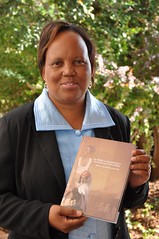Selection of filmed interviews of women on gender research for agricultural development, available on the ILRI Film page n the web (blip.tv screen capture).
To celebrate the centenary of International Women’s Day, 8 March 2011, ILRI produced and web-posted on 8 March the following eight very short filmed interviews of four women on where we are in gender-related research for agricultural development in poor countries.
The interviews were made at a recent conference, ‘Gender and Market-Oriented Agriculture: From Research to Practice’ (31 January–2 February 2011), held at the Addis Ababa, Ethiopia, campus of the International Livestock Research Institute (ILRI) and organized by ILRI and a project conducted by ILRI on behalf of the Ethiopian government: Improving Productivity and Market Success of Ethiopian Farmers (IPMS).
Can complex gender issues be translated into enabling policies for women?
Susan MacMillan (ILRI) says that if we do not manage to find ways to place our understanding of gender issues in the context of environment, economy, agriculture, education and health, our well-meaning research might end up doing more harm than good. While gender is now on the agenda of every government and every big development project in the world, we don’t yet know what policies manage to empower women or how to implement them.
Evidence is needed to improve women’s development
Seblewongel Deneke (Canadian International Development Agency [CIDA]) says there are still misconceptions about rural women in developing countries, such as the idea that most farmers are men. The evidence that ILRI is providing will help to address these misconceptions.
Gender mainstreaming is just beginning
Seblewongel Deneke (CIDA) says that although many people are now talking about mainstreaming gender by including gender issues in research and policymaking, new laws around gender in Ethiopia are rarely enforced and research projects find it hard to expand capacity within extension workers and trainers and so meet the complex needs of women.
Rural women miss opportunities due to heavy household duties
Anne Waters-Bayer (Ecology, Technology, Culture Foundation (ETC) Netherlands) argues that gender research still struggles to help women manage their household and childraising work. Without targeting training in these areas, women will continue to miss out.
Women farmers held back by traditions
Jemimah Njuki (ILRI) explains that two facts have hindered women’s development in agriculture: lack of ability to inherit land and other rules stemming from traditional cultures and the fact that most policymakers are men; changes are now occurring in both areas.
Training men and women farmers together could help both make more money
Susan MacMillan (ILRI) says that when businesses become profitable, they tend to be taken over by men. This is one reason why women find it hard to make money from agriculture. Training male and female household members together may allow both to see that it’s in everyone’s interest to reduce gender inequities so that households can improve their income and nutrition.
30 Years of gender research—Are the conversations still the same?
Anne Waters-Bayer (Ecology, Technology, Culture Foundation [ETC] Netherlands) says the gender challenges faced by agricultural scientists in the 1980s are, unfortunately, similar to those we face today. Many women are still living in material want, struggling to send their children to school, to get good health care and to generate and control an income from their agricultural work.
For more information, visit ILRI’s Gender and Agriculture blog or IPMS blog.



 Sheila Ommeh is a thirty two year old PhD student from Kenya working on chicken genetics at the International Livestock Research Institute (ILRI).
Sheila Ommeh is a thirty two year old PhD student from Kenya working on chicken genetics at the International Livestock Research Institute (ILRI).














